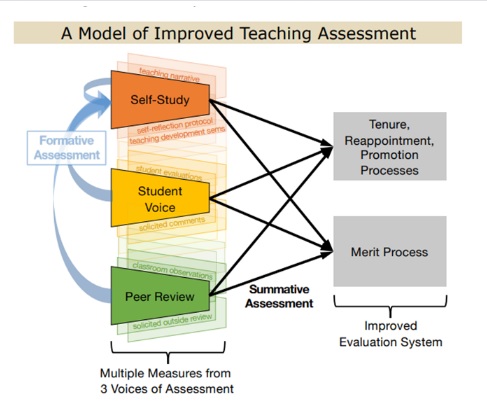By: Virginia Pitts, Director of University Teaching, Office of Teaching and Learning
On May 17, as part of the Provost’s Conference Series, Drs. Noah Finkelstein and Sarah Andrews joined us once again, as part of a campus-wide initiative to reimagine the teaching evaluation process. In the keynote address, “Advancing Teaching Evaluation: A University-Wide Effort,” Dr. Finkelstein spoke to the importance of engaging all stakeholders in the process of reimagining teaching evaluation—emphasizing that the work must be done with those who are teaching, not to those who are teaching; and positing that only through a systematic and holistic approach can we ensure a more inclusive and equitable environment.
Building upon their April 1 visit—where they introduced the Teaching Quality Framework (TQF), a research-based framework for defining and assessing teaching quality premised on teaching as a form of scholarship—Drs. Finkelstein and Andrews invited attendees to delve more deeply into the TQF criteria and consider the extent to which these criteria apply in their own work/departments. They also shared creative and constructive ways other institutions have engaged voices of self, peers, and students in both formative and summative assessment process (e.g., University of Massachusetts Amherst teaching evaluation template, University of Kansas benchmarks rubric).

The TQF Model of improved teaching assessment from Noah Finkelstein, Sarah Andrews, Alanna Pawlak, Dena Rezaei, Jessica Keating, Joel Corbo, and Mark Gammon (CU); Daniel Reinholz (SDSU); Daniel Bernstein (KU); and the CU Center for STEM Learning.
As an attendee and Departmental Action Team (DAT) facilitator (I am privileged to be working with the First-Year Languages DAT), I came away feeling hopeful and inspired. The conversation was thought-provoking, and I will continue to mull over the ideas we discussed. For example, I love the notion of peer feedback on teaching (through observation, artifact review, and reflective discussion) as professional development for both the reviewer and the teacher. It reminded me of the “peer classroom-visit program” the Office of Teaching and Learning facilitated some years ago, wherein professors joined small peer groups in observing and reflecting on each other’s teaching for the sole purpose of improving their own practice. I was also intrigued by ideas for engaging students in the process—beyond end-of-course evaluations—that are supportive and sustainable for all those who engage in this important work.
However, it was the interactions with the other attendees that left me especially hopeful and inspired. As I joined in discussion with my table-mates and others who had chosen to be in this space when there are so many other demands on their time, I was struck by how many people at DU care deeply about teaching and who really are great at it, even though they bring different gifts and passions and go about the work of teaching differently. So, I am hopeful about what is possible when we come together, think together, talk together, learn together about the kind of teaching we aspire to, and how we might amplify and acknowledge the great work people are doing.
